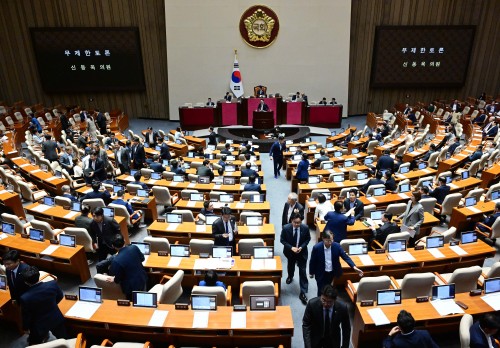 |
| Lawmakers of the Democratic Party walk out of the National Assembly chamber on August 4 as Rep. Shin Dong-wook of the People Power Party launches a filibuster against the introduction of the “broadcasting three bills.” / Source: Lee Byung-hwa |
The August extraordinary session of the National Assembly is set to descend further into confrontation as lawmakers grapple with contentious bills, the prosecution’s raid on the People Power Party (PPP) headquarters, and the recent pardons of Cho Kuk and former lawmaker Yoon Mi-hyang.
According to parliamentary sources on August 17, the Democratic Party plans to convene plenary sessions starting August 21 to handle key legislation, including revisions to the Broadcasting Culture Promotion Act and the Educational Broadcasting System Act, the so-called “Yellow Envelope Act,” and the second round of Commercial Act amendments.
The PPP has already announced it will launch filibusters against these bills. Since the ruling bloc holds enough seats to forcibly end each filibuster after 24 hours, the bills are expected to be passed one by one in a “salami-slicing” fashion, with the process likely concluding around August 24.
For the PPP, the filibuster is less about blocking passage than about rallying public opinion by highlighting what it sees as the bills’ flaws.
The Democrats are expected to push the Broadcasting Culture Promotion Act first. The bill was introduced on the final day of the July session but its vote was carried over to the next session after a PPP filibuster. By rule, a filibuster automatically ends with the close of a session.
Kim Byung-ki, the Democratic Party’s floor leader, has vowed to process other urgent reform and livelihood bills as well, including the two broadcasting bills, the Yellow Envelope Act, and the second Commercial Act amendment.
Once these bills are cleared, the ruling bloc is expected to turn its focus to prosecutorial reform. Democratic Party leader Jung Chung-rae has pledged to complete such legislation before the Chuseok holiday, stressing the need to revise special counsel laws to allow longer investigative periods and expanded mandates.
Analysts say the push could also serve as a strategy to pressure the opposition under a “end of insurrection” framing ahead of next year’s local elections.
Meanwhile, the PPP has fiercely resisted the special counsel’s attempt to raid its headquarters and obtain party membership records, denouncing it as “illegal.” Party leaders have instructed all lawmakers to remain on emergency standby in anticipation of further raids.
The PPP has also intensified its attacks over President Lee Jae-myung’s pardons of Cho Kuk and Yoon Mi-hyang, calling them unjustified and out of step with public sentiment. The party is amplifying allegations against ruling bloc figures, branding Rep. Lee Chun-seok’s alleged stock dealings as the “National Planning Committee Gate” and weighing the introduction of a separate special counsel bill.
Most Read
-
1
-
2
-
3
-
4
-
5
-
6
-
7





















